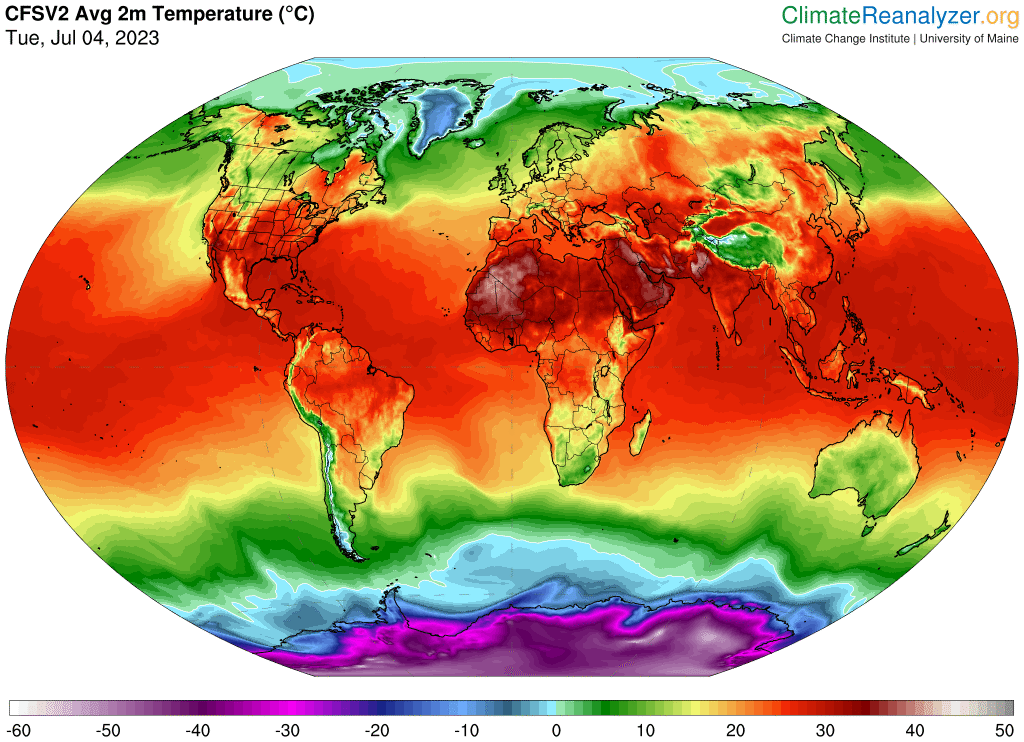July 4, 2023, will forever be etched in history as the hottest day ever recorded on Earth since the commencement of temperature records in 1979. According to data from the U.S. National Centers for Environmental Prediction, the global average temperature soared to an alarming 62.92 degrees Fahrenheit (17.18 degrees Celsius), signaling the intensifying impact of the climate crisis.
The scorching temperatures experienced on July 4 were attributed to a combination of factors. Climate change, a consequence of human activities leading to increased greenhouse gas emissions, played a significant role in pushing global temperatures to unprecedented levels. Furthermore, the return of the El Niño weather pattern and the arrival of summer in the northern hemisphere contributed to the extreme heatwave experienced worldwide.
Scientists now speculate that July 4, 2023, may have been the hottest day on Earth in approximately 125,000 years, underscoring the magnitude of the current climate crisis. The Earth’s climate system is undergoing dramatic changes, which are significantly altering weather patterns and causing extreme events with severe consequences.
The United States witnessed the impact of this record-breaking heat, with an estimated 57 million people exposed to dangerous conditions, as reported by The Washington Post‘s extreme heat tracker. Concurrently, China endured a blistering heat wave, while even the frigid Antarctic experienced warmer-than-usual temperatures during its winter season. In North Africa, temperatures surged to a scorching 122 degrees Fahrenheit (50 degrees Celsius), further highlighting the global nature of the heatwave.
The calculations for the global average air temperature on July 4 were derived using a comprehensive model that incorporated data from weather stations, ships, ocean buoys, and satellites. Paulo Ceppi, a climate scientist from London’s Grantham Institute, explained that this model provides the “best guess” of surface temperatures across the planet on that fateful day.
While historical temperature records primarily rely on instrument-based data from the mid-19th century onwards, scientists also depend on proxy data obtained from sources such as tree rings and ice cores to understand pre-industrial temperatures. Analysis of such proxy data suggests that the Earth has not experienced temperatures this high for at least 125,000 years, during the previous interglacial period between ice ages.
This new record surpasses the previous one set just a day prior, on July 3, when the global average temperature reached 62.62 degrees Fahrenheit. The previous highest recorded average temperature occurred during the previous El Niño cycle on August 14, 2016, measuring 62.46 degrees Fahrenheit.
Experts emphasize that urgent action is imperative to combat carbon emissions and address the root causes of the climate crisis. Without significant efforts to reduce greenhouse gas emissions and mitigate the effects of climate change, temperatures are projected to continue rising. Myles Allen, a professor of geosystem science at Oxford University, warns that the convergence of global warming, El Niño, and the annual cycle in the coming months could result in even hotter days, amplifying the urgency for climate action.
The record-breaking heatwave experienced on July 4 serves as a stark reminder of the increasingly dire consequences of climate change. It underscores the urgent need for global cooperation and immediate steps to transition to sustainable practices, reduce emissions, and protect the planet for future generations. The world must unite to address the climate crisis before the impacts become irreversible.
(With inputs from agencies)
A global media for the latest news, entertainment, music fashion, and more.




